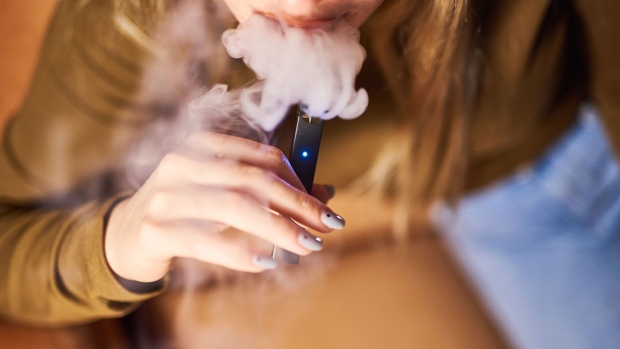Oct 7, 2019
Juul accused by U.S. school districts of creating vaping ‘nuisance’
, Bloomberg News

School districts in New York, Kansas and Missouri sued Juul Labs Inc. over the economic burden created by teen vaping, opening a new legal front as the U.S. grapples with a widening public-health crisis.
Officials of school districts in Long Island, New York; Johnson County, Kansas; and Missouri’s St. Charles County accused Juul of intentionally targeting teens with its product and creating a public nuisance with the health problems tied to vaping. The complaints filed in federal courts Monday make the same arguments local governments are using against opioid makers over a nationwide addiction epidemic.
Juul dominates the U.S. market for e-cigarettes, and its sleek vaporizer has been especially popular with younger users. Altria Group Inc. –- parent of tobacco maker Philip Morris International Inc. -- invested about US$13 billion in the closely held San Francisco-based company last year in exchange for a 35 per cent stake.
Juul’s conduct “has given rise to an epidemic of vaping across America and within plaintiff’s school district,’’ administrators of the Three Village Central School District said in their complaint. The Long Island district said it’s been forced to pay out “significant resources combating this public nuisance of defendant’s creation’’ and will continue to do so.
Josh Raffel, a spokesman for San Francisco-based Juul, had no immediate comment on the suits.
Juul has rapidly shifted its business practices following a surge in underage e-cigarette use and a rash of mysterious lung injuries that U.S. public-health officials have linked to vaping. In recent weeks, the company installed a new chief executive officer, stopped advertising entirely, and vowed to end its lobbying in Washington.
At least 18 deaths in the U.S. have been tied to vaping by the U.S. Centers for Disease Control and Prevention along with more than 1,000 lung injuries. Meanwhile, suits against e-cigarette makers have been piling up.
Juul is a defendant in almost a dozen federal-court suits consolidated in San Francisco for pre-trial information exchanges. Some of those complaints also name Altria as a defendant. The company also faces more than 40 suits in state courts. Some plaintiffs include parents claiming their children have become nicotine addicts as a result of using e-cigarettes.
Altria spokesman Steven Callahan says those suits are “meritless" and that the conduct alleged in them occurred before it had an economic interest in Juul.
“This won’t be the same magnitude as opioid or tobacco litigation, because vaping hasn’t been around for 30 years,” said Holly Froum, a Bloomberg Intelligence litigation analyst, “but it bears some similarities.”
More than 2,000 U.S. states, cities and counties are suing drugmakers over allegedly illegal marketing of opioid painkillers that they say have created a public-health crisis that has risen to the level of a public nuisance. Some analysts say the companies may have to pay as much as US$150 billion to resolve the cases.
Lawyers for the school districts claim Juul and other e-cigarette makers created a similar nuisance by flavoring their products and aggressively marketing them to teens. Juul created “a condition dangerous to the public’s health’’ through its actions, the Kansas school districts said in its suit.
Schools have struggled to get a handle on vaping, administrators say. The smallest devices are easy to conceal and use on the sly, and many kids have been drawn in by candy and other sweet flavors. An estimated 5 million middle and high school students now use e-cigarettes, according to the Campaign for Tobacco-Free Kids.
Brian Zahn, a principal at Southampton High School in New York, held a town hall earlier this month with about 200 parent and teacher attendees. Zahn estimated that 65 to 75 per cent of the school’s 650 students are vaping, and that the national numbers look low compared to what he discusses with other principals. Southampton High School isn’t involved in the litigation.
“I’ve had numerous cases of my top learners take nosedives because they are now hooked,” Zahn said. “They can’t even stay in a class for a full 40 minutes -- my athletes as well.”
The principal said the problem is a drain on his staff’s time as teachers deal with students sneaking vapes in class or need special training to help them identify vaping devices that can look like thumb drives or pens. He estimates that Southampton High spends around $200,000 on additional staff, like social workers, to deal with the problem.
“Instead of spending taxpayer money on educational programming,” Zahn said in a phone interview on Friday, “I’m now diverting our funds to deal with a generation of addicted students.”
The cases are Three Village Central School District v. Juul Labs, 19-5662, U.S. District Court, Eastern District of New York; Unified School District No. 233, Johnson County, Kansas v. Juul Labs, 19-cv-2608, U.S. District Court, District of Kansas; and Francis Howell School District v. Juul Labs, 19-cv-02713, U.S. District Court, Eastern District of Missouri.


